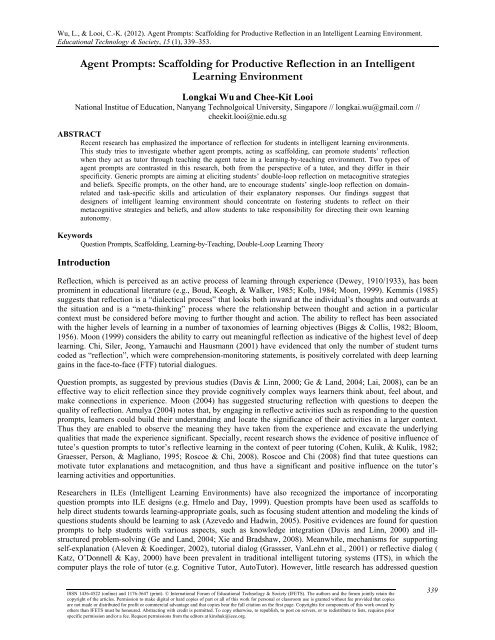January 2012 Volume 15 Number 1 - Educational Technology ...
January 2012 Volume 15 Number 1 - Educational Technology ...
January 2012 Volume 15 Number 1 - Educational Technology ...
Create successful ePaper yourself
Turn your PDF publications into a flip-book with our unique Google optimized e-Paper software.
Wu, L., & Looi, C.-K. (<strong>2012</strong>). Agent Prompts: Scaffolding for Productive Reflection in an Intelligent Learning Environment.<br />
<strong>Educational</strong> <strong>Technology</strong> & Society, <strong>15</strong> (1), 339–353.<br />
Agent Prompts: Scaffolding for Productive Reflection in an Intelligent<br />
Learning Environment<br />
Longkai Wu and Chee-Kit Looi<br />
National Institue of Education, Nanyang Technolgoical University, Singapore // longkai.wu@gmail.com //<br />
cheekit.looi@nie.edu.sg<br />
ABSTRACT<br />
Recent research has emphasized the importance of reflection for students in intelligent learning environments.<br />
This study tries to investigate whether agent prompts, acting as scaffolding, can promote students’ reflection<br />
when they act as tutor through teaching the agent tutee in a learning-by-teaching environment. Two types of<br />
agent prompts are contrasted in this research, both from the perspective of a tutee, and they differ in their<br />
specificity. Generic prompts are aiming at eliciting students’ double-loop reflection on metacognitive strategies<br />
and beliefs. Specific prompts, on the other hand, are to encourage students’ single-loop reflection on domainrelated<br />
and task-specific skills and articulation of their explanatory responses. Our findings suggest that<br />
designers of intelligent learning environment should concentrate on fostering students to reflect on their<br />
metacognitive strategies and beliefs, and allow students to take responsibility for directing their own learning<br />
autonomy.<br />
Keywords<br />
Question Prompts, Scaffolding, Learning-by-Teaching, Double-Loop Learning Theory<br />
Introduction<br />
Reflection, which is perceived as an active process of learning through experience (Dewey, 1910/1933), has been<br />
prominent in educational literature (e.g., Boud, Keogh, & Walker, 1985; Kolb, 1984; Moon, 1999). Kemmis (1985)<br />
suggests that reflection is a “dialectical process” that looks both inward at the individual’s thoughts and outwards at<br />
the situation and is a “meta-thinking” process where the relationship between thought and action in a particular<br />
context must be considered before moving to further thought and action. The ability to reflect has been associated<br />
with the higher levels of learning in a number of taxonomies of learning objectives (Biggs & Collis, 1982; Bloom,<br />
1956). Moon (1999) considers the ability to carry out meaningful reflection as indicative of the highest level of deep<br />
learning. Chi, Siler, Jeong, Yamauchi and Hausmann (2001) have evidenced that only the number of student turns<br />
coded as “reflection”, which were comprehension-monitoring statements, is positively correlated with deep learning<br />
gains in the face-to-face (FTF) tutorial dialogues.<br />
Question prompts, as suggested by previous studies (Davis & Linn, 2000; Ge & Land, 2004; Lai, 2008), can be an<br />
effective way to elicit reflection since they provide cognitively complex ways learners think about, feel about, and<br />
make connections in experience. Moon (2004) has suggested structuring reflection with questions to deepen the<br />
quality of reflection. Amulya (2004) notes that, by engaging in reflective activities such as responding to the question<br />
prompts, learners could build their understanding and locate the significance of their activities in a larger context.<br />
Thus they are enabled to observe the meaning they have taken from the experience and excavate the underlying<br />
qualities that made the experience significant. Specially, recent research shows the evidence of positive influence of<br />
tutee’s question prompts to tutor’s reflective learning in the context of peer tutoring (Cohen, Kulik, & Kulik, 1982;<br />
Graesser, Person, & Magliano, 1995; Roscoe & Chi, 2008). Roscoe and Chi (2008) find that tutee questions can<br />
motivate tutor explanations and metacognition, and thus have a significant and positive influence on the tutor’s<br />
learning activities and opportunities.<br />
Researchers in ILEs (Intelligent Learning Environments) have also recognized the importance of incorporating<br />
question prompts into ILE designs (e.g. Hmelo and Day, 1999). Question prompts have been used as scaffolds to<br />
help direct students towards learning-appropriate goals, such as focusing student attention and modeling the kinds of<br />
questions students should be learning to ask (Azevedo and Hadwin, 2005). Positive evidences are found for question<br />
prompts to help students with various aspects, such as knowledge integration (Davis and Linn, 2000) and illstructured<br />
problem-solving (Ge and Land, 2004; Xie and Bradshaw, 2008). Meanwhile, mechanisms for supporting<br />
self-explanation (Aleven & Koedinger, 2002), tutorial dialog (Grassser, VanLehn et al., 2001) or reflective dialog (<br />
Katz, O’Donnell & Kay, 2000) have been prevalent in traditional intelligent tutoring systems (ITS), in which the<br />
computer plays the role of tutor (e.g. Cognitive Tutor, AutoTutor). However, little research has addressed question<br />
ISSN 1436-4522 (online) and 1176-3647 (print). © International Forum of <strong>Educational</strong> <strong>Technology</strong> & Society (IFETS). The authors and the forum jointly retain the<br />
copyright of the articles. Permission to make digital or hard copies of part or all of this work for personal or classroom use is granted without fee provided that copies<br />
are not made or distributed for profit or commercial advantage and that copies bear the full citation on the first page. Copyrights for components of this work owned by<br />
others than IFETS must be honoured. Abstracting with credit is permitted. To copy otherwise, to republish, to post on servers, or to redistribute to lists, requires prior<br />
specific permission and/or a fee. Request permissions from the editors at kinshuk@ieee.org.<br />
339

















